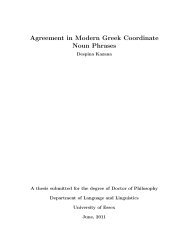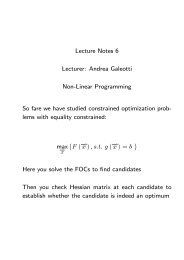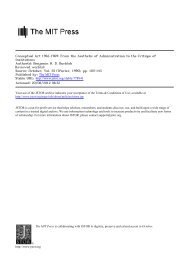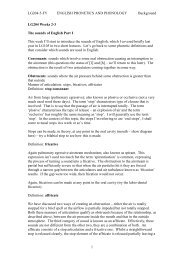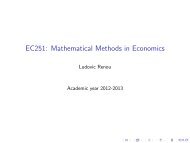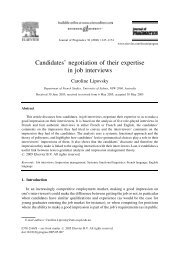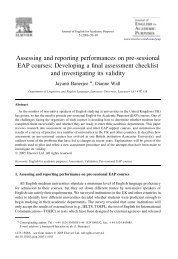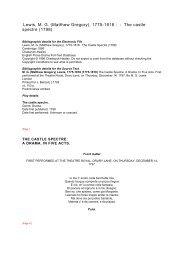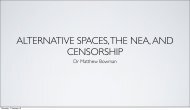Separate Tables: Schools and Sects in Political Science Author(s ...
Separate Tables: Schools and Sects in Political Science Author(s ...
Separate Tables: Schools and Sects in Political Science Author(s ...
You also want an ePaper? Increase the reach of your titles
YUMPU automatically turns print PDFs into web optimized ePapers that Google loves.
<strong>Separate</strong> <strong>Tables</strong>: <strong>Schools</strong> <strong>and</strong> <strong>Sects</strong> <strong>in</strong> <strong>Political</strong> <strong>Science</strong><br />
<strong>Author</strong>(s): Gabriel A. Almond<br />
Source: PS: <strong>Political</strong> <strong>Science</strong> <strong>and</strong> Politics, Vol. 21, No. 4 (Autumn, 1988), pp. 828-842<br />
Published by: American <strong>Political</strong> <strong>Science</strong> Association<br />
Stable URL: http://www.jstor.org/stable/420022<br />
Accessed: 06/10/2008 05:17<br />
Your use of the JSTOR archive <strong>in</strong>dicates your acceptance of JSTOR's Terms <strong>and</strong> Conditions of Use, available at<br />
http://www.jstor.org/page/<strong>in</strong>fo/about/policies/terms.jsp. JSTOR's Terms <strong>and</strong> Conditions of Use provides, <strong>in</strong> part, that unless<br />
you have obta<strong>in</strong>ed prior permission, you may not download an entire issue of a journal or multiple copies of articles, <strong>and</strong> you<br />
may use content <strong>in</strong> the JSTOR archive only for your personal, non-commercial use.<br />
Please contact the publisher regard<strong>in</strong>g any further use of this work. Publisher contact <strong>in</strong>formation may be obta<strong>in</strong>ed at<br />
http://www.jstor.org/action/showPublisher?publisherCode=apsa.<br />
Each copy of any part of a JSTOR transmission must conta<strong>in</strong> the same copyright notice that appears on the screen or pr<strong>in</strong>ted<br />
page of such transmission.<br />
JSTOR is a not-for-profit organization founded <strong>in</strong> 1995 to build trusted digital archives for scholarship. We work with the<br />
scholarly community to preserve their work <strong>and</strong> the materials they rely upon, <strong>and</strong> to build a common research platform that<br />
promotes the discovery <strong>and</strong> use of these resources. For more <strong>in</strong>formation about JSTOR, please contact support@jstor.org.<br />
http://www.jstor.org<br />
American <strong>Political</strong> <strong>Science</strong> Association is collaborat<strong>in</strong>g with JSTOR to digitize, preserve <strong>and</strong> extend access to<br />
PS: <strong>Political</strong> <strong>Science</strong> <strong>and</strong> Politics.
<strong>Separate</strong><br />
<strong>Schools</strong> <strong>and</strong> <strong>Sects</strong><br />
<strong>in</strong> <strong>Political</strong> <strong>Science</strong>*<br />
Gabriel A. Almond<br />
Stanford University<br />
"'Miss Cooper: Lonel<strong>in</strong>ess is a terrible th<strong>in</strong>g<br />
Miss Cooper: Is any type an 'alone' type,<br />
Miss Meacham. . ?"<br />
<strong>Tables</strong><br />
(From Terence Rattigan's <strong>Separate</strong> <strong>Tables</strong>,<br />
(1955, 78, 92) GABRIEL A. ALMOND<br />
In <strong>Separate</strong> <strong>Tables</strong>, the hit of the 1955 New York theatrical season, the Irish playwright,<br />
Terence Rattigan, used the metaphor of solitary d<strong>in</strong>ers <strong>in</strong> a second-rate residential hotel <strong>in</strong><br />
Cornwall to convey the lonel<strong>in</strong>ess of the human condition. It may be a bit far fetched to<br />
use this metaphor to describe the condition of political science <strong>in</strong> the 1980s. But <strong>in</strong> some<br />
sense the various schools <strong>and</strong> sects of political science now sit at separate tables, each with<br />
its own conception of proper political science, but each protect<strong>in</strong>g some secret isl<strong>and</strong> of<br />
vulnerability.<br />
It was not always so. If we recall the state of the profession a quarter of a century ago,<br />
let us say <strong>in</strong> the early 1960s, David Easton's (1953) <strong>and</strong> David Truman's (1955) scold<strong>in</strong>gs of<br />
the profession for its backwardness among the social science discipl<strong>in</strong>es, had been taken to<br />
heart by a substantial <strong>and</strong> productive cadre of young political scientists. In 1961 Robert<br />
Dahl wrote his Epitaph for a Monument to a Successful Protest reflect<strong>in</strong>g the sure confidence<br />
of a successful movement, whose leaders were rapidly becom<strong>in</strong>g the most visible figures <strong>in</strong><br />
the profession. Neither Dahl nor He<strong>in</strong>z Eulau, whose Behavioral Persuasion appeared <strong>in</strong><br />
1963 made exaggerated or exclusive claims for the new political science. They expressed<br />
the view that the scientific approach to the study of political phenomena had proven itself,<br />
<strong>and</strong> that it could take its place alongside political philosophy, public law, <strong>and</strong> <strong>in</strong>stitutional<br />
history <strong>and</strong> description, as an important approach to the study of politics. As the part of<br />
the discipl<strong>in</strong>e "on the move," so to speak, it created some worry among the older subdiscipl<strong>in</strong>es.<br />
An appropriate metaphor for the state of political science at that time, perhaps<br />
would be the "young Turk-old Turk" model, with the young Turks already beg<strong>in</strong>n<strong>in</strong>g<br />
to gray at the temples. But we were all Turks.<br />
Now there is this uneasy separateness. The public choice people seek an anchorage <strong>in</strong><br />
reality, a "new <strong>in</strong>stitutionalism," to house their powerful deductive apparatus; the<br />
political econometricians want to relate to historical <strong>and</strong> <strong>in</strong>stitutional processes; the<br />
humanists cr<strong>in</strong>ge at the avoidance of political values by "scientism," <strong>and</strong> suffer from feel-<br />
828<br />
PS: <strong>Political</strong> <strong>Science</strong> <strong>and</strong> Politics<br />
r
Methodological<br />
Dimension<br />
Figure I.<br />
Ideological Dimension<br />
Left Right<br />
Hard HL HR<br />
Soft SL SR<br />
<strong>Separate</strong> <strong>Tables</strong><br />
<strong>in</strong>gs of <strong>in</strong>adequacy <strong>in</strong> a world dom<strong>in</strong>ated by statistics <strong>and</strong> technology; <strong>and</strong> the radical <strong>and</strong><br />
"critical" political theorists, like the ancient prophets, lay about them with anathemas<br />
aga<strong>in</strong>st the behaviorists <strong>and</strong> positivists, <strong>and</strong> the very notion of a political science professionalism<br />
that would separate knowledge from action. But their anti-professionalism must<br />
leave them <strong>in</strong> doubt as to whether they are scholars or politicians.<br />
The uneas<strong>in</strong>ess <strong>in</strong> the political science profession is not of the body but of the soul. In the<br />
last several decades the profession has more than doubled <strong>in</strong> numbers. American type<br />
political science has spread to Europe, Lat<strong>in</strong> America, Japan, <strong>and</strong> more <strong>in</strong>terest<strong>in</strong>gly to<br />
Ch<strong>in</strong>a <strong>and</strong> the USSR. <strong>Political</strong> science has taken on the organizational <strong>and</strong> methodological<br />
attributes of science-research <strong>in</strong>stitutes, large-scale budgets, the use of statistical <strong>and</strong><br />
mathematical methods, <strong>and</strong> the like. <strong>Political</strong> science has prospered materially, but it is not<br />
a happy profession.<br />
We are separated along two dimensions; an ideological one, <strong>and</strong> a methodological one<br />
(see Figure I). On the methodological dimension there are the extremes of soft <strong>and</strong> hard.<br />
At the soft extreme are Clifford Geertz (1973) types of "thickly descriptive," cl<strong>in</strong>ical<br />
studies. As an example of this k<strong>in</strong>d of scholarship Albert Hirschman (1970) celebrated the<br />
John Womack (1969) biography of the Mexican guerrilla hero, Emiliano Zapata, with its<br />
almost complete lack of conceptualization, hypothesiz<strong>in</strong>g, efforts to prove propositions<br />
<strong>and</strong> the like. Despite this lack of self-conscious social science, Hirschman argues, the<br />
Zapata study was full of theoretical implications of the greatest importance. Leo Strauss<br />
(1959) <strong>and</strong> his followers <strong>in</strong> political philosophy with their exegetical approach to the evocation<br />
of the ideas of political philosophers come pretty close to this soft extreme as well,<br />
but while Womack's k<strong>in</strong>d of work leaves everyth<strong>in</strong>g but narrative <strong>and</strong> description to<br />
implication, Straussian exegesis <strong>in</strong>volves the discipl<strong>in</strong>e of the explication of the great texts,<br />
ascerta<strong>in</strong><strong>in</strong>g their "true" mean<strong>in</strong>g through the analysis of their language.<br />
Somewhat away from the soft extreme, but still on the soft side of the cont<strong>in</strong>uum,<br />
would be political philosophical studies more open to empirical evidence <strong>and</strong> logical<br />
analysis. Recent work such as that of Michael Walzer on justice (1983) <strong>and</strong> obligation<br />
(1970), Carole Pateman on participation (1970) <strong>and</strong> obligation (1979) would be illustrative.<br />
Here there is more than a simple, rich evocation of an event or personality, or precise<br />
exegesis of the ideas of political philosophers. A logical argument is advanced, often tested<br />
through the exam<strong>in</strong>ation of evidence, <strong>and</strong> developed more or less rigorously.<br />
At the other extreme of the methodological cont<strong>in</strong>uum are the quantitative, econometric,<br />
<strong>and</strong> mathematical modell<strong>in</strong>g studies; <strong>and</strong> the most extreme would be the comb<strong>in</strong>ation<br />
of mathematical modell<strong>in</strong>g, statistical analysis, experiment, <strong>and</strong> computer simulation<br />
<strong>in</strong> the public choice literature. Theories of vot<strong>in</strong>g, coalition mak<strong>in</strong>g, decision-mak<strong>in</strong>g <strong>in</strong><br />
committees, <strong>and</strong> <strong>in</strong> bureaucracies, <strong>in</strong>volv<strong>in</strong>g the test<strong>in</strong>g of hypotheses generated by formal,<br />
mathematical models would exemplify this hard extreme.<br />
On the ideological cont<strong>in</strong>uum on the left we have four groups <strong>in</strong> the Marxist traditionthe<br />
Marxists properly speak<strong>in</strong>g, the "critical political theorists," the dependencistas, <strong>and</strong><br />
the world system theorists, all of whom deny the possibility of separat<strong>in</strong>g knowledge from<br />
action, <strong>and</strong> who subord<strong>in</strong>ate political science to the struggle for socialism. At the conservative<br />
end of the cont<strong>in</strong>uum are the neo-conservatives who favor among other th<strong>in</strong>gs a<br />
Fall 1988 829
<strong>Separate</strong> <strong>Tables</strong><br />
free market economy, <strong>and</strong> limits on the power of the state, as well as an aggressive anticommunist<br />
foreign policy.<br />
If we comb<strong>in</strong>e these two dimensions we end up with four schools of political science,<br />
four separate tables-the soft-left, the hard-left, the soft-right, <strong>and</strong> the hard-right tables.<br />
Reality, of course, is not quite this neat. The ideological <strong>and</strong> methodological shad<strong>in</strong>gs are<br />
more complex, more subtle. To elaborate our metaphor a bit but still with<strong>in</strong> the refectoral<br />
realm, s<strong>in</strong>ce the overwhelm<strong>in</strong>g majority of political scientists are somewhere <strong>in</strong> the<br />
center-"liberal" <strong>and</strong> moderate <strong>in</strong> ideology, <strong>and</strong> eclectic <strong>and</strong> open to conviction <strong>in</strong><br />
methodology-we might speak of the great cafeteria of the center, from which most of us<br />
select our <strong>in</strong>tellectual food, <strong>and</strong> where we are seated at large tables with mixed <strong>and</strong><br />
chang<strong>in</strong>g table companions.<br />
The outly<strong>in</strong>g tables <strong>in</strong> this discipl<strong>in</strong>ary refectory are strongly lit <strong>and</strong> visible, while the large<br />
center lies <strong>in</strong> shade. It is unfortunate that the mood <strong>and</strong> reputation of the political science<br />
discipl<strong>in</strong>e is so heavily <strong>in</strong>fuenced by these extreme views. This is <strong>in</strong> part because the<br />
extremes make themselves highly audible <strong>and</strong> visible-the soft left provid<strong>in</strong>g a pervasive<br />
flagellant background noise, <strong>and</strong> the hard right provid<strong>in</strong>g virtuoso mathematical <strong>and</strong> statistical<br />
displays appear<strong>in</strong>g <strong>in</strong> the pages of our learned journals.<br />
The Soft Left<br />
Suppose we beg<strong>in</strong> with the soft left. All of the sub-groups of the soft left share <strong>in</strong> the<br />
meta-methodological assumption that the empirical world cannot be understood <strong>in</strong> terms<br />
of separate spheres <strong>and</strong> dimensions, but has to be understood as a time-space totality.<br />
"Critical theory," as developed by Horkheimer, Adorno, Marcuse, <strong>and</strong> others of the<br />
"Frankfurt School" reject the alleged detachment <strong>and</strong> disaggregat<strong>in</strong>g strategy of<br />
ma<strong>in</strong>stream social science. The various parts of the social process must be seen " . . as<br />
aspects of a total situation caught up <strong>in</strong> the process of historical change" (Lukacs quoted <strong>in</strong><br />
David Held [ 1980], 164). The student as well as that which he studies is <strong>in</strong>volved <strong>in</strong> struggle.<br />
Hence objectivity is <strong>in</strong>appropriate. "Positivists fail to comprehend that the process of<br />
know<strong>in</strong>g cannot be severed from the historical struggle between humans <strong>and</strong> the world.<br />
Theory <strong>and</strong> theoretical labor are <strong>in</strong>tertw<strong>in</strong>ed <strong>in</strong> social life processes. The theorist cannot<br />
rema<strong>in</strong> detached, passively contemplat<strong>in</strong>g, reflect<strong>in</strong>g <strong>and</strong> describ<strong>in</strong>g 'society' or 'nature'"<br />
(Held, 165). To underst<strong>and</strong> <strong>and</strong> expla<strong>in</strong> one must have a commitment to an outcome.<br />
There is no political science <strong>in</strong> the positivist sense, that is, a political science separable from<br />
ideological commitment. To seek to separate it is a commitment to support the exist<strong>in</strong>g,<br />
historically obsolescent order.<br />
The more orthodox Marxists such as Perry Anderson (1976), Goran Therborn (1977),<br />
Philip Slater (1977), <strong>and</strong> others, while shar<strong>in</strong>g the meta-methodology of the "Critical<br />
school," go further <strong>and</strong> argue that unless one accepts historical materialism <strong>in</strong> the fullest<br />
reductionist sense of expla<strong>in</strong><strong>in</strong>g the political realm <strong>in</strong> class struggle terms, one ends up fail<strong>in</strong>g<br />
to appreciate the relationship between theory <strong>and</strong> "praxis."<br />
As we consider the composition of the soft left our four-fold metaphor of separate<br />
tables beg<strong>in</strong>s to break down. The Marxist theorists of several persuasions-the "critical<br />
theorists," the "dependency" writers, <strong>and</strong> "world system" theorists-make quarrelsome<br />
table companions. What they all share is a common belief <strong>in</strong> the unity of theory <strong>and</strong><br />
praxis, <strong>in</strong> the impossibility of separat<strong>in</strong>g science <strong>and</strong> politics. As a logical consequence<br />
positivist political science, which believes <strong>in</strong> the necessity of separat<strong>in</strong>g scientific activity<br />
from political activity, loses contact with the overrid<strong>in</strong>g unity of the historical process <strong>and</strong><br />
830<br />
PS: <strong>Political</strong> <strong>Science</strong> <strong>and</strong> Politics
<strong>Separate</strong> <strong>Tables</strong><br />
is m<strong>in</strong>dlessly l<strong>in</strong>ked to the status quo. Positivist political science fails to take <strong>in</strong>to account<br />
the historical dialectic which makes the shift from capitalism to socialism <strong>in</strong>evitable.<br />
Fern<strong>and</strong>o Cardoso, the lead<strong>in</strong>g theorist of the dependency school, contrasts the<br />
methodology of dependency theory with the North American social science tradition <strong>in</strong><br />
the follow<strong>in</strong>g language:<br />
We attempt to reestablish the <strong>in</strong>tellectual tradition based on a comprehensive social science. We<br />
seek a global <strong>and</strong> dynamic underst<strong>and</strong><strong>in</strong>g of social structures <strong>in</strong>stead of look<strong>in</strong>g only at specific<br />
dimensions of the social process. We oppose the academic tradition which conceived of dom<strong>in</strong>ation<br />
<strong>and</strong> social-cultural relations as "dimensions" analytically <strong>in</strong>dependent of one another <strong>and</strong><br />
together <strong>in</strong>dependent of the economy, as if each one of these dimensions corresponded to<br />
separate features of reality. .. . We use a dialectical approach to study society, its structures <strong>and</strong><br />
processes of change. ... In the end what has to be discussed as an alternative is not the consolidation<br />
of the state <strong>and</strong> the fulfillment of "autonomous capitalism," but how to supercede<br />
them. The important question, then, is how to construct paths toward socialism. (Cardoso <strong>and</strong><br />
Faletto, 1979, ix <strong>and</strong> xxiv)<br />
<strong>Political</strong> science can only be science then, if it is fully committed to the atta<strong>in</strong>ment of<br />
socialism.<br />
One of the lead<strong>in</strong>g American expositors of the "'dependency" approach, Richard Fagen,<br />
draws the implications of Cardoso's views for the academic community concerned with<br />
development issues. Real progress <strong>in</strong> development scholarship has to be associated with a<br />
restructur<strong>in</strong>g of asymmetric <strong>in</strong>ternational power relations <strong>and</strong> ". . a much more difficult<br />
<strong>and</strong> historically significant assault on capitalist forms of development themselves .... Only<br />
when this crucial underst<strong>and</strong><strong>in</strong>g <strong>in</strong>fuses the nascent academic critique of the global capitalist<br />
system will we be able to say that the paradigm shift <strong>in</strong> ma<strong>in</strong>stream U.S. social science is<br />
gather<strong>in</strong>g steam <strong>and</strong> mov<strong>in</strong>g scholarship closer to what really matters" (1978, 80).<br />
Two recent <strong>in</strong>terpretations of the history of American political science show that this<br />
"soft-left" critique of ma<strong>in</strong>stream work <strong>in</strong> the discipl<strong>in</strong>e has taken on some momentum.<br />
David Ricci <strong>in</strong> The Tragedy of <strong>Political</strong> <strong>Science</strong> (1984) traces the emergence of a liberal scientific<br />
school of political science <strong>in</strong> post-World War II America, a movement dedicated,<br />
accord<strong>in</strong>g to Ricci, to prov<strong>in</strong>g the superior virtue of liberal pluralistic values <strong>and</strong> assumptions<br />
by the most precise methods. The validity of this complacent "empirical political<br />
theory" constructed by such political scientists as David Truman, Robert Dahl, C. E. L<strong>in</strong>dblom,<br />
the University of Michigan group of vot<strong>in</strong>g specialists, <strong>and</strong> others, was underm<strong>in</strong>ed<br />
<strong>in</strong> the disorders of the late 1960s <strong>and</strong> early 1970s, <strong>and</strong> <strong>in</strong> the associated discredit<strong>in</strong>g of<br />
American politics <strong>and</strong> public policy. Ricci draws the implication of this behavioral-postbehavioral<br />
episode, as demonstrat<strong>in</strong>g that political science as empirical science without the<br />
systematic <strong>in</strong>clusion of moral <strong>and</strong> ethical values <strong>and</strong> alternatives, <strong>and</strong> a commitment to<br />
political action, is doomed to disillusion. <strong>Political</strong> science has to choose sides; fail<strong>in</strong>g to do<br />
so results <strong>in</strong> its withdrawal <strong>in</strong>to specialized preciosity, <strong>and</strong> futility.<br />
... ~4<br />
Ive44d.4sr~ .*Aj~4 'e tdc ici4~4<br />
.f^^^^ . . O<br />
Ricci's soft leftism is of the humanist moderate left variety. That of Raymond Seidelman<br />
(1985) is a more sharply radical treatment of the history of American political science. In a<br />
book entitled Disenchanted Realists: <strong>Political</strong> <strong>Science</strong> <strong>and</strong> the American Crisis, 1884-1984,<br />
Seidelman develops the thesis <strong>in</strong> detail that there have been three trends <strong>in</strong> American<br />
political theory-an <strong>in</strong>stitutionalist trend, a democratic populist trend, <strong>and</strong> a relatively<br />
Fall 1988 831<br />
4~t
<strong>Separate</strong> <strong>Tables</strong><br />
short-lived "liberal political science" trend, <strong>in</strong>itiated <strong>in</strong> the 1920s <strong>and</strong> 1930s by the University<br />
of Chicago school, <strong>and</strong> flower<strong>in</strong>g <strong>in</strong> the United States <strong>in</strong> the post-World War 11 years<br />
roughly until the 1970s. The <strong>in</strong>stitutionalist trend is the Hamiltonian-Madisonian tradition<br />
embodied <strong>in</strong> the constitutional system, so constructed that it would frustrate the will of<br />
majorities. Separation of powers theory is based on a distrust of popular propensities.<br />
Contrasted with this tradition of American political theory, is the democratic populist<br />
trend manifested <strong>in</strong> early agrarian egalitarianism, abolitionism, populism, <strong>and</strong> the like. This<br />
second Thomas Pa<strong>in</strong>e tradition is anti-statist, anti-government <strong>and</strong> was discredited by the<br />
rise of <strong>in</strong>dustrial-urban society <strong>and</strong> the necessity for strong central government.<br />
The third tradition was based on a belief <strong>in</strong> the possibility of a science of politics which<br />
would help produce a powerful national state, manned by tra<strong>in</strong>ed experts pursu<strong>in</strong>g constructive<br />
<strong>and</strong> coherent public policies, <strong>and</strong> supported by virtuous popular majorities. This<br />
third tradition dream of a great constructive political science has been dispelled on both<br />
the political <strong>and</strong> the science sides. <strong>Political</strong> reality has turned <strong>in</strong>to a disarticulated set of<br />
e %, Ofo44444$4s4 o hm4 4w 4<br />
elite-dom<strong>in</strong>ated "issue networks" <strong>and</strong> "iron triangles," <strong>in</strong>capable of pursu<strong>in</strong>g consistent<br />
<strong>and</strong> effective public policies; <strong>and</strong> the science has turned <strong>in</strong>to a set of disembodied specialties<br />
lack<strong>in</strong>g <strong>in</strong> l<strong>in</strong>kage to politics <strong>and</strong> public policy. Seidelman concludes:<br />
Historically, political science professionalism has only obscured fundamental conflicts <strong>and</strong> choices<br />
<strong>in</strong> American public life, for it has treated citizens as objects of study or clients of a benign political<br />
paternalism .... Until political scientists realize that their democratic politics cannot be realized<br />
through a barren professionalism, <strong>in</strong>tellectual life will rema<strong>in</strong> cleaved from the genu<strong>in</strong>e if heretofore<br />
subterranean dreams of American citizens. <strong>Political</strong> science history has confirmed this<br />
separation, even as it has tried to bridge it. Modern political science must bridge it, if delusions<br />
are to be transformed <strong>in</strong>to new democratic realities. (241)<br />
The burden of the soft left, thus, is an attack on political science professionalism. It is a<br />
call to the academy to jo<strong>in</strong> the political fray, to orient its teach<strong>in</strong>g <strong>and</strong> research around left<br />
ideological commitments-<strong>in</strong> particular, moderate or revolutionary socialism.<br />
The Hard Right<br />
The hard right, on the other h<strong>and</strong>, is ultra-professional at the methodological level,<br />
deploy<strong>in</strong>g a formidable array of scientific methodologies-deductive, statistical, <strong>and</strong><br />
experimental. There is a tendency to view softer historical, descriptive, <strong>and</strong> unsophisticated<br />
quantitative analysis as pre-professional, as <strong>in</strong>ferior breeds of political science,<br />
although <strong>in</strong> recent years there has been a notable rediscovery of political <strong>in</strong>stitutions, <strong>and</strong><br />
an effort to relate formal deductive work to the empirical tradition pioneered by Gosnell,<br />
Herr<strong>in</strong>g, V. 0. Key.<br />
William Mitchell (1988), <strong>in</strong> a recent review of the public choice movement <strong>in</strong> political<br />
science, dist<strong>in</strong>guishes between the two pr<strong>in</strong>cipal centers, which he calls the Virg<strong>in</strong>ia <strong>and</strong><br />
Rochester <strong>Schools</strong>. The Virg<strong>in</strong>ia school, <strong>in</strong>fluential ma<strong>in</strong>ly among economists, was founded<br />
by James Buchanan <strong>and</strong> Gordon Tullock. The founder of the Rochester school, more <strong>in</strong>fluential<br />
among political scientists, was William Riker. Both schools tend to be skeptical of<br />
politics <strong>and</strong> bureaucracy <strong>and</strong> are fiscally conservative. But the Virg<strong>in</strong>ia school views the<br />
market unambiguously as the benchmark of efficient allocation. The Virg<strong>in</strong>ians accord<strong>in</strong>g to<br />
Mitchell display a ". . . firm conviction that the private economy is far more robust,<br />
832<br />
PS: <strong>Political</strong> <strong>Science</strong> <strong>and</strong> Politics
<strong>Separate</strong> <strong>Tables</strong><br />
efficient, <strong>and</strong> perhaps equitable than other economies, <strong>and</strong> much more successful than<br />
political processes <strong>in</strong> efficiently allocat<strong>in</strong>g resources .... Much of what has been produced<br />
by the [Virg<strong>in</strong>ian] Center for Study of Public Choice, can best be described as contributions<br />
to a theory of the failure of political processes .. <strong>in</strong>equity, <strong>in</strong>efficiency, <strong>and</strong> coercion<br />
are the most general results of democratic policy formation" (pp. 106-7). Buchanan proposed<br />
an automatic deficit reduction plan years before the adoption of the Gramm-<br />
Rudman-Holl<strong>in</strong>gs proposal; <strong>and</strong> he was the author of an early version of the proposed<br />
constitutional budget-balanc<strong>in</strong>g amendment. Buchanan, <strong>in</strong> two books-Democracy <strong>in</strong><br />
Deficit, The <strong>Political</strong> Legacy of Lord Keynes (1977), <strong>and</strong> The Economics of Politics (1978)presents<br />
a view of democratic politics <strong>in</strong> which voters act <strong>in</strong> terms of their short-run<br />
<strong>in</strong>terests, that is to say oppose taxes <strong>and</strong> favor material benefits for themselves; politicians<br />
naturally play <strong>in</strong>to these propensities by favor<strong>in</strong>g spend<strong>in</strong>g <strong>and</strong> oppos<strong>in</strong>g tax<strong>in</strong>g; <strong>and</strong><br />
bureaucrats seek to extend their power <strong>and</strong> resources without regard to the public<br />
<strong>in</strong>terest.<br />
These theorists differ <strong>in</strong> the extent to which they believe that the short-run utility maximizer<br />
model captures human reality. Some scholars employ the model only as a way of<br />
generat<strong>in</strong>g hypotheses. Thus Robert Axelrod, us<strong>in</strong>g deductive modell<strong>in</strong>g, experimentation<br />
<strong>and</strong> computer simulation, has made important contributions to our underst<strong>and</strong><strong>in</strong>g of how<br />
cooperative norms emerge, <strong>and</strong> <strong>in</strong> particular how norms of <strong>in</strong>ternational cooperation<br />
might develop from an orig<strong>in</strong>al short-run utility maximiz<strong>in</strong>g perspective (1984). Douglass<br />
North (1981), Samuel Popk<strong>in</strong> (1979), Robert Bates (1988), <strong>and</strong> others comb<strong>in</strong>e rational<br />
choice modell<strong>in</strong>g with sociological analysis <strong>in</strong> their studies of third world development <strong>and</strong><br />
historical process.<br />
That this view is on the defensive is reflected <strong>in</strong> recent comments of scholars with<br />
unquestionable scientific credentials. Thus Herbert Simon challenges the rational choice<br />
assumption of this literature:<br />
It makes a difference to research, a very large difference, to our research strategy whether we<br />
are study<strong>in</strong>g the nearly omniscient homo economicus of rational choice theory or the boundedly<br />
rational homo psychologicus of cognitive psychology. It makes a difference for research, but it also<br />
makes a difference for the proper design of political <strong>in</strong>stitutions. James Madison was well aware<br />
of that, <strong>and</strong> <strong>in</strong> the pages of the Federalist Papers, he opted for this view of the human condition;<br />
"As there is a degree of depravity <strong>in</strong> mank<strong>in</strong>d which requires a certa<strong>in</strong> degree of circumspection<br />
<strong>and</strong> distrust, so there are other qualities <strong>in</strong> human nature which justify a certa<strong>in</strong> portion of<br />
esteem <strong>and</strong> confidence:"-a balanced <strong>and</strong> realistic view, we may concede, of bounded human<br />
rationality <strong>and</strong> its accompany<strong>in</strong>g frailties of motive <strong>and</strong> reason. (303)<br />
eM,ltc'Olh5~ai^ "iL#c ^h^W fI 0<br />
^VyM4"~I S4i 1k ?4,<br />
pd>ie 4d p te Ae9 e ec; ee F<br />
td*4iM U 0i U d ;44 A Cto t<br />
detr-A,ie Ci4e* I,, L4 4Li I,V<br />
James March <strong>and</strong> Johan Olsen attack the formalism of the public choice literature. "The<br />
new <strong>in</strong>stitutionalism is an empirically based prejudice, an assertion that what we observe <strong>in</strong><br />
the world is <strong>in</strong>consistent with the ways <strong>in</strong> which contemporary theories ask us to talk. . .<br />
The bureaucratic agency, the legislative committee, <strong>and</strong> the appellate court are arenas for<br />
Fall 1988 833
<strong>Separate</strong> <strong>Tables</strong><br />
contend<strong>in</strong>g social forces, but they are also collections of st<strong>and</strong>ard operat<strong>in</strong>g procedures<br />
<strong>and</strong> structures that det<strong>in</strong>e <strong>and</strong> defend <strong>in</strong>terests" (1984, 738). They similarly question the<br />
rational self-<strong>in</strong>terest assumption of the public choice literature, argu<strong>in</strong>g,<br />
Although self-<strong>in</strong>terest undoubtedly permeates politics, action is often based more on discover<strong>in</strong>g<br />
the normatively appropriate behavior than on calculat<strong>in</strong>g the return expected from alternative<br />
choices. As a result, political behavior, like other behavior, can be described <strong>in</strong> terms of duties,<br />
obligations, roles, <strong>and</strong> rules. (744)<br />
The Soft Right<br />
In the soft-right cell there are miscellaneous conservatives of an old <strong>and</strong> a "neo" variety,<br />
who tend to be traditional <strong>in</strong> their methodologies <strong>and</strong> on the right side of the ideological<br />
spectrum. But the followers of Leo Strauss <strong>in</strong> political theory are a dist<strong>in</strong>ctive breed<br />
<strong>in</strong>deed. Their methodological conservatism is unambiguous. The enlightenment <strong>and</strong> the<br />
scientific revolution are the arch-enemy. High on their list of targets is the value free <strong>and</strong><br />
ethically neutral political science of Max Weber. As Leo Strauss put it, "Moral obtuseness<br />
is the necessary condition for scientific analysis. The more serious we are as social scientists<br />
the more completely we develop with<strong>in</strong> ourselves a state of <strong>in</strong>difference to any goal, or to<br />
aimlessness <strong>and</strong> drift<strong>in</strong>g, a state of what may be called nihilism" (1959, 19). But political<br />
science is not only amoral, it is not really productive of knowledge. Aga<strong>in</strong> Leo Strauss,<br />
"Generally speak<strong>in</strong>g, one may wonder whether the new political science has brought to<br />
light anyth<strong>in</strong>g of political importance which <strong>in</strong>telligent political practitioners with a deep<br />
knowledge of history, nay <strong>in</strong>telligent <strong>and</strong> educated journalists, to say noth<strong>in</strong>g of the old<br />
political scientists, did not know at least as well beforeh<strong>and</strong>" (<strong>in</strong> Stor<strong>in</strong>g, 1962, 312).<br />
The Straussians reject all "historicist" <strong>and</strong> "sociology of knowledge" <strong>in</strong>terpretations of<br />
political theory. The true mean<strong>in</strong>g of philosophical texts is conta<strong>in</strong>ed <strong>in</strong> what has been<br />
written. The political philosopher must have the skill <strong>and</strong> <strong>in</strong>sight necessary to explicate this<br />
orig<strong>in</strong>al mean<strong>in</strong>g. The ultimate truth can be located <strong>in</strong> the writ<strong>in</strong>gs of the orig<strong>in</strong>al classic<br />
philosophers, <strong>and</strong> particularly <strong>in</strong> the writ<strong>in</strong>gs of Plato-<strong>in</strong> his Socratic rationalism shorn of<br />
all cont<strong>in</strong>gency. Truths transcend time, place, <strong>and</strong> context. Post-Machiavellian political<br />
philosophy has led to moral relativism <strong>and</strong> the decay of civic virtue; "behavioral" political<br />
science is the debased product of this moral decl<strong>in</strong>e.<br />
In the recent celebrations of the 200th anniversary of the Constitution, the Straussians,<br />
as one might expect, were <strong>in</strong> the vanguard of the "orig<strong>in</strong>al <strong>in</strong>tent" school of constitutional<br />
<strong>in</strong>terpretation. Gordon Wood, <strong>in</strong> a recent review of the Straussian literature on the Constitution,<br />
(1988) po<strong>in</strong>ts out that for such Straussians as Gary McDowell <strong>and</strong> Walter Berns<br />
the whole truth about the Constitution is conta<strong>in</strong>ed <strong>in</strong> the constitutional text, <strong>and</strong> perhaps<br />
the record of the debates, <strong>and</strong> the Federalist Papers. Wood po<strong>in</strong>ts out that the Straussian<br />
commitment to "natural right," leads them to distrust of all historically derived rights<br />
". . . particularly those recently discovered by the Supreme Court" (1988, 39). For some<br />
Straussians the natural right to property postulated by the Founders may be grounds for<br />
roll<strong>in</strong>g back the modern welfare state. The moral model regime for many Straussians is the<br />
Platonic aristocracy, or as second-best, Aristotelian "mixed government." Their program<br />
of action is a call for an <strong>in</strong>tellectual elite which will br<strong>in</strong>g us back to first pr<strong>in</strong>ciples.<br />
The Hard Left<br />
There is f<strong>in</strong>ally a hard left school, which employs scientific methodology <strong>in</strong> test<strong>in</strong>g propositions<br />
derived from socialist <strong>and</strong> dependency theories. However, the moment one makes<br />
834<br />
PS: <strong>Political</strong> <strong>Science</strong> <strong>and</strong> Politics
<strong>Separate</strong> <strong>Tables</strong><br />
explicit <strong>and</strong> testable the assumptions <strong>and</strong> beliefs of left ideologies, one has gone part of the<br />
way toward reject<strong>in</strong>g the anti-professionalism of the left. And this is reflected <strong>in</strong> the nervousness<br />
of lead<strong>in</strong>g socialist <strong>and</strong> dependency theorists over quantification <strong>and</strong> the test<strong>in</strong>g<br />
of hypotheses. Thus Christopher Chase-Dunn, one of the lead<strong>in</strong>g world system quantifiers,<br />
pleads with his colleagues, "My concern is that we not become bogged down <strong>in</strong> a<br />
sterile debate between 'historicists' <strong>and</strong> 'social scientists,' or between quantitative <strong>and</strong><br />
qualitative researchers. The 'ethnic' boundaries may provide us with much material for<br />
spirited dialogue, but a real underst<strong>and</strong><strong>in</strong>g of the world system will require that we transcend<br />
methodological sectarianism" (1982, 181). The lead<strong>in</strong>g dependency theorists such as<br />
Cardoso <strong>and</strong> Fagen raise serious questions regard<strong>in</strong>g the validity of "scientific type, quantitative"<br />
studies of dependency propositions. For reasons not clearly specified such<br />
research is "premature," or misses the po<strong>in</strong>t. Thus, they probably would not accept as<br />
valid the f<strong>in</strong>d<strong>in</strong>gs of the Sylvan, Snidal, Russett, Jackson, <strong>and</strong> Duvall (1982) group which<br />
tested a formal model of "dependencia" on a world-wide set of dependent countries <strong>in</strong><br />
the 1970-75 period, <strong>and</strong> came up with mixed <strong>and</strong> <strong>in</strong>conclusive results. Nevertheless the<br />
dependency <strong>and</strong> world system quantifiers <strong>and</strong> econometricians, <strong>in</strong>clud<strong>in</strong>g political scientists<br />
<strong>and</strong> sociologists such as Chase-Dunn (1977) <strong>and</strong> Rub<strong>in</strong>son (1979), Albert Bergesen<br />
(1980), Volker Bornschier (1981) <strong>and</strong> others, are carry<strong>in</strong>g on quantitative studies oriented<br />
toward the demonstration of the validity of world system <strong>and</strong> dependency propositions.<br />
Gett<strong>in</strong>g Our Professional<br />
History Straight<br />
Most political scientists would f<strong>in</strong>d themselves uncomfortable seated at these outly<strong>in</strong>g<br />
tables. Hav<strong>in</strong>g become a major academic profession only <strong>in</strong> the last two or three generations,<br />
we are not about to cast off our badges of professional <strong>in</strong>tegrity by turn<strong>in</strong>g our<br />
research <strong>and</strong> teach<strong>in</strong>g <strong>in</strong>to political advocacy. This is reflected <strong>in</strong> the partial defection from<br />
anti-professionalism by the hard left, who <strong>in</strong>sist that assertions about society <strong>and</strong> politics<br />
can be tested by formulat<strong>in</strong>g them explicitly <strong>and</strong> precisely, <strong>and</strong> us<strong>in</strong>g statistical methods<br />
where appropriate.<br />
Similarly most of us are troubled at the preemption by the public choice <strong>and</strong> statistical<br />
political scientists of the badge of professionalism, <strong>and</strong> their demotion of the rest of us to a<br />
prescientific status. And this concern is shared by some of the most reputable <strong>and</strong><br />
sophisticated of our more rigorous political scientists, who are currently engaged <strong>in</strong> relat<strong>in</strong>g<br />
to <strong>and</strong> rehabilitat<strong>in</strong>g the older political science methodologies, such as philosophical,<br />
legal <strong>and</strong> historical analysis, <strong>and</strong> <strong>in</strong>stitutional description.<br />
And there are few political scientists <strong>in</strong>deed who would share the view that all political<br />
science s<strong>in</strong>ce the sixteenth century is a deviation from the true path, <strong>and</strong> that the sole<br />
route to professionalism is through the exegesis of the classical texts of political theory.<br />
h444 t 4Acsi* t*e, fta, 4 4 4?.<br />
It is noteworthy that each of these schools or sects presents us with a particular version<br />
of the history of the political science discipl<strong>in</strong>e. Whoever controls the <strong>in</strong>terpretation of the<br />
past <strong>in</strong> our professional history writ<strong>in</strong>g has gone a long way toward controll<strong>in</strong>g the future.<br />
The soft left has almost pre-empted the writ<strong>in</strong>g of professional political science history <strong>in</strong><br />
recent years. I believe they may have succeeded <strong>in</strong> conv<strong>in</strong>c<strong>in</strong>g some of us that we have<br />
deviated from the true path. Both Ricci <strong>and</strong> Seidelman would have us believe that modern<br />
political science with its stress on methodology <strong>and</strong> objectivity could only develop <strong>in</strong> the<br />
United States where for a brief <strong>in</strong>terval it appeared that liberal democracy <strong>and</strong> an objective<br />
professionalism were possible. As this American optimism abates, <strong>and</strong> as party <strong>and</strong><br />
class antagonism sharpens <strong>in</strong>evitably, they argue, a politically neutral political science<br />
becomes untenable. Accord<strong>in</strong>g to this view political science must aga<strong>in</strong> become an active<br />
part of a political, <strong>and</strong> for some, a revolutionary movement.<br />
Fall 1988 835
<strong>Separate</strong> <strong>Tables</strong><br />
The view of professional history presented by the hard right is a very foreshortened<br />
one. Accord<strong>in</strong>g to this view, prior to the <strong>in</strong>troduction of mathematical, statistical, <strong>and</strong><br />
experimental methodologies there was no political science <strong>and</strong> theory <strong>in</strong> the proper<br />
sense.<br />
But the large methodologically eclectic majority of political scientists, <strong>and</strong> those who are<br />
committed to the control of ideological bias <strong>in</strong> the conduct of professional work-what I<br />
call the 'Cafeteria of the center"'-ought not to concede the writ<strong>in</strong>g of discipl<strong>in</strong>ary history<br />
to any one of these schools. The history of political science does not lead to any one of<br />
these separate tables, but rather to the methodologically mixed <strong>and</strong> objectivity-aspir<strong>in</strong>g<br />
scholarship of the center.<br />
tHA/4 W tcJf 4 0t, e 4 .*<br />
w^e, fA Oet 4 tt4 e4/ c<br />
?Ue - 4 le c^h^e ^tc Ily er?? ow<br />
4
<strong>Separate</strong> <strong>Tables</strong><br />
comparative study of the rise of the British <strong>and</strong> American party systems; <strong>and</strong> Michels, on<br />
the "iron law of oligarchy," the propensity <strong>in</strong> large bureaucratic organizations for power<br />
to gravitate to the top leadership, which he derived from his "critical" case study of the<br />
Social Democratic Party of Germany. More recently, Duverger's "law" of the relationship<br />
between the electoral <strong>and</strong> party systems also came from Europe.<br />
Among the early pioneers of modern professional political science it was common practice<br />
to speak of this branch of scholarship as a "science" from the very beg<strong>in</strong>n<strong>in</strong>g. Thus Sir<br />
Frederick Pollock <strong>and</strong> John Robert Seeley, the first lectur<strong>in</strong>g from Oxford <strong>and</strong> the Royal<br />
Institution, the second from Cambridge, entitled their books The History of the <strong>Science</strong> of<br />
Politics (1890) <strong>and</strong> An Introduction to <strong>Political</strong> <strong>Science</strong> (1896), respectively. What these early<br />
writers meant by "science" varied from case to case. Pollock dist<strong>in</strong>guishes between the<br />
natural <strong>and</strong> moral sciences.<br />
.. . [T]he comparative <strong>in</strong>exactness of the moral sciences is not the fault of the men who have<br />
devoted their abilities to them, but depends, as Aristotle already saw, on the nature of their subject<br />
matter. (1890, 5)<br />
For John Robert Seeley political science was to be a body of propositions drawn from<br />
historical knowledge. He expected a takeoff <strong>in</strong> the development of political science<br />
because of the development of historiography <strong>in</strong> the 19th century. If the moderns were to<br />
do so much better than Locke, Hobbes, <strong>and</strong> Montesquieu, it was because their historical<br />
data base was much richer.<br />
For Seeley, who <strong>in</strong>troduced political science <strong>in</strong>to the Cambridge Tripos, it meant learn<strong>in</strong>g<br />
to ". . . reason, generalize, def<strong>in</strong>e, <strong>and</strong> dist<strong>in</strong>guish ... as well as collect<strong>in</strong>g, authenticat<strong>in</strong>g,<br />
<strong>and</strong> <strong>in</strong>vestigat<strong>in</strong>g facts ..." These two processes constituted political science. "If we<br />
neglect the first process, we shall accumulate facts to little purpose, because we shall have<br />
no test by which to dist<strong>in</strong>guish facts which are important from those which are unimportant;<br />
<strong>and</strong> of course, if we neglect the second process, our reason<strong>in</strong>gs will be baseless,<br />
<strong>and</strong> we shall but weave scholastic cobwebs" (1896, 27-8).<br />
.e. weetw sols f tug <strong>in</strong> A te a t ca e t<br />
There were two schools of thought <strong>in</strong> the 19th <strong>and</strong> early 20th century social sciences<br />
regard<strong>in</strong>g the degree or k<strong>in</strong>d of science which was possible. The work of Auguste Comte,<br />
Karl Marx, <strong>and</strong> Vilfredo Pareto makes no dist<strong>in</strong>ction between the social <strong>and</strong> the "natural"<br />
sciences. Both groups of sciences sought uniformities, regularities, laws. On the other h<strong>and</strong><br />
the notion of a social science which would consist of ". .. a closed system of concepts, <strong>in</strong><br />
which reality is synthesized <strong>in</strong> some sort of permanently <strong>and</strong> universally valid classification,<br />
<strong>and</strong> from which it can aga<strong>in</strong> be deduced. . ." was viewed as entirely mean<strong>in</strong>gless by Max<br />
Weber.<br />
The stream of immeasurable events flows unend<strong>in</strong>gly towards eternity. The cultural problems<br />
which move men form themselves ever anew <strong>and</strong> <strong>in</strong> different colors, <strong>and</strong> the boundaries of that<br />
area <strong>in</strong> the <strong>in</strong>f<strong>in</strong>ite stream of concrete events which acquires mean<strong>in</strong>g <strong>and</strong> significance for us, i.e.<br />
which becomes an "historical <strong>in</strong>dividual" are constantly subject to change. The <strong>in</strong>tellectual contexts<br />
from which it is viewed <strong>and</strong> scientifically analyzed shift. (1949, 80)<br />
The "lawfulness" of human <strong>in</strong>teraction is of a different order for Max Weber. The subject<br />
matter of the social sciences-human action-<strong>in</strong>volves value orientation, memory <strong>and</strong><br />
learn<strong>in</strong>g, which can only yield "soft" regularities, "objective possibilities" <strong>and</strong> probabili-<br />
Fall 1988 837
<strong>Separate</strong> <strong>Tables</strong><br />
ties. Cultural change may attenuate or even dissolve these relationships. Similarly Durkheim<br />
viewed cultural phenomena as too complex <strong>and</strong> open to human creativity to lend<br />
themselves to the same degree of causal certa<strong>in</strong>ty as the natural sciences.<br />
Dur<strong>in</strong>g the first decades of professional political science <strong>in</strong> the United States-from 1900<br />
to the 1930s-two scholars, Merriam <strong>and</strong> Catl<strong>in</strong>, the first as American as apple pie, the<br />
second a temporarily transplanted Englishman-took the lead <strong>in</strong> advocat<strong>in</strong>g the <strong>in</strong>troduction<br />
of scientific methods <strong>and</strong> st<strong>and</strong>ards <strong>in</strong> the study of politics. Merriam's contribution<br />
was primarily programmatic, <strong>and</strong> promotional. He advocated, recruited personnel, <strong>and</strong><br />
funded a particular research program at the University of Chicago. He also was a founder<br />
of the Social <strong>Science</strong> Research Council. Catl<strong>in</strong> wrote on methodological questions, differentiat<strong>in</strong>g<br />
between history <strong>and</strong> political science, <strong>and</strong> locat<strong>in</strong>g political science among the<br />
social sciences.<br />
In his 1921 manifesto, "The Present State of the Study of Politics," Merriam (1925)<br />
advocated the <strong>in</strong>troduction of psychological <strong>and</strong> sociological <strong>in</strong>sights <strong>in</strong>to the study of<br />
political <strong>in</strong>stitutions <strong>and</strong> processes, <strong>and</strong> of the <strong>in</strong>troduction of statistical methods <strong>in</strong> an<br />
effort to enhance the rigor of political analysis. Nowhere <strong>in</strong> this early call to professional<br />
growth <strong>and</strong> improvement is there anyth<strong>in</strong>g approximat<strong>in</strong>g a discussion of scientific<br />
methodology. He proposed to do political science rather than talk about it. And <strong>in</strong>deed, <strong>in</strong><br />
the decades follow<strong>in</strong>g at the University of Chicago, a research program unfolded exemplify<strong>in</strong>g<br />
Merriam's stress on empirical research, quantification, <strong>and</strong> social-psychological<br />
<strong>in</strong>terpretation. The scholars produced by this program constituted a substantial part of<br />
the nucleus of the post-World War "behavioral movement."<br />
George Catl<strong>in</strong> may have been the first to speak of a "behaviorist treatment of politics"<br />
(1927, xi), <strong>and</strong> <strong>in</strong> his argument about a science of politics seems to dispose of all of those<br />
objections which would differentiate social <strong>and</strong> human subject matters from those of<br />
natural science. But he is hardly sangu<strong>in</strong>e about the prospects of science.<br />
Politics must for the present conf<strong>in</strong>e itself to the humble task of collect<strong>in</strong>g, where possible<br />
measur<strong>in</strong>g, <strong>and</strong> sort<strong>in</strong>g the historical material, past <strong>and</strong> contemporary; <strong>and</strong> follow<strong>in</strong>g up probable<br />
clues to the discovery of permanent forms <strong>and</strong> general pr<strong>in</strong>ciples of action. ... It is reasonable to<br />
expect that political science will prove to be more than this, that it will give us some <strong>in</strong>sight <strong>in</strong>to<br />
the possibility of controll<strong>in</strong>g the social situation, <strong>and</strong> will show us, if not what it is wise to do, at<br />
least what, human nature be<strong>in</strong>g what it is, it is unwise to do, because such action will cut across<br />
the gra<strong>in</strong> of the social structure <strong>and</strong> athwart the l<strong>in</strong>es of activity of the deeper forces which have<br />
built up this structure. (1927, 142-43).<br />
Thus Bernard Crick's (1959) argument that it was the behavioral movement <strong>in</strong> American<br />
political science, <strong>and</strong> particularly the Chicago school that was responsible for lead<strong>in</strong>g<br />
838<br />
PS: <strong>Political</strong> <strong>Science</strong> <strong>and</strong> Politics
<strong>Separate</strong> <strong>Tables</strong><br />
political science down the garden path of scientism cannot bear careful exam<strong>in</strong>ation of the<br />
sources. In both Europe <strong>and</strong> America meta-methodological op<strong>in</strong>ion has been divided on<br />
this question. It would be hard to f<strong>in</strong>d more hard science oriented scholars than Comte,<br />
Marx, Pareto, <strong>and</strong> Freud. Durkheim <strong>and</strong> Weber, while fully committed to the pursuit of<br />
science, clearly recognized that the social scientist dealt with a subject matter less tractable<br />
to cover<strong>in</strong>g-law hard science forms of explanation. This polemic diffused to the United<br />
States <strong>in</strong> the course of the twentieth century.<br />
4. 44 0...<br />
la?t !u^ 4e ?4^4t^<br />
efasp4to<br />
t<br />
V ?4c<br />
Crick's attribution of this scientific orientation to Chicago populists does not hold up<br />
when we exam<strong>in</strong>e the evidence. One has to read the Tocqueville correspondence (1962)<br />
to appreciate how close that brilliant <strong>in</strong>terpreter of American democracy, a century<br />
before the Chicago school saw the light of day, came to do<strong>in</strong>g an op<strong>in</strong>ion survey <strong>in</strong> his<br />
travels around the country. As he talked to a steamboat capta<strong>in</strong> on the Mississippi, to<br />
farmers <strong>in</strong> the <strong>in</strong>terior, to bourgeois d<strong>in</strong>ner companions on the eastern seabord, <strong>and</strong> to<br />
officeholders <strong>in</strong> Wash<strong>in</strong>gton, D.C., sampl<strong>in</strong>g the American population was clearly on his<br />
m<strong>in</strong>d. Karl Marx drew up a six-page questionnaire for the study of the liv<strong>in</strong>g conditions,<br />
work<strong>in</strong>g conditions, attitudes, <strong>and</strong> beliefs of the French work<strong>in</strong>g class <strong>in</strong> the early 1880s. A<br />
large number of copies were distributed to socialists <strong>and</strong> work<strong>in</strong>g class organizations. The<br />
data gathered were to be used <strong>in</strong> the forthcom<strong>in</strong>g general election (I 880). In Max Weber's<br />
work<strong>in</strong>g papers for his study of the peasantry <strong>in</strong> East Prussia there is evidence that he<br />
planned <strong>and</strong> partially executed a survey of Polish <strong>and</strong> German peasant attitudes. And <strong>in</strong><br />
his study of comparative religion he used a formal two-by-two table-worldl<strong>in</strong>essunworldl<strong>in</strong>ess,<br />
asceticism-mysticism-as a way of generat<strong>in</strong>g hypotheses about the relationship<br />
between religious ethics <strong>and</strong> economic attitudes.<br />
Most of the important discoveries <strong>in</strong> the development of statistics were made by<br />
Europeans. La Place <strong>and</strong> Condorcet were Frenchmen; the Bernoulli family were Swiss;<br />
Bayes, Galton, Pearson, <strong>and</strong> Fisher were Englishmen; Pareto was an Italian; Markov a<br />
Russian. The first "public choice" theorist was the Welshman, Duncan Black (1958). The<br />
view that the quantitative approach to social science analysis was peculiarly American<br />
doesn't st<strong>and</strong> up to the historical record. What was peculiarly American was the improvement<br />
<strong>in</strong>, <strong>and</strong> the application of, quantitative methods as <strong>in</strong> survey research, content<br />
analysis, aggregate statistical analysis, mathematical modell<strong>in</strong>g <strong>and</strong> the like, <strong>and</strong> the pursuit<br />
<strong>in</strong> empirical depth of psychological <strong>and</strong> sociological hypotheses largely generated <strong>in</strong> the<br />
European social science literature.<br />
74 v4w tV44 t^t ^U^4M/e f te 44%e+<br />
0 44<br />
At the darkest moment <strong>in</strong> European history-<strong>in</strong> the 1930s-there was a strong <strong>in</strong>fusion<br />
of European social science <strong>in</strong>to the United States through refugees such as Paul Lazarsfeld,<br />
Kurt Lew<strong>in</strong>, Marie Jahoda, Wolfgang Kohler, Hans Speier, Erich Fromm, Franz Neumann,<br />
Otto Kircheimer, Leo Lowenthal, Franz Alex<strong>and</strong>er, Hannah Arendt, Hans Morgenthau,<br />
Leo Strauss, <strong>and</strong> many others. It should be quite clear from this litany of names that this<br />
emigration carried the various social science polemics with<strong>in</strong> it, <strong>and</strong> that the counterposi-<br />
tion of a European <strong>and</strong> an American approach to social science around the issue of human-<br />
ist vs. scientific scholarship will simply not bear the light of day. There is clear cont<strong>in</strong>uity<br />
Fall 1988 839<br />
44t<br />
I<br />
a4?i.
<strong>Separate</strong> <strong>Tables</strong><br />
from the European background to the growth of the social sciences <strong>and</strong> political science <strong>in</strong><br />
the United States.<br />
This broad tradition of political science beg<strong>in</strong>n<strong>in</strong>g with the Greeks <strong>and</strong> cont<strong>in</strong>u<strong>in</strong>g up to<br />
the creative scholars of our own generation, is the historically correct version of our discipl<strong>in</strong>ary<br />
history. The critical <strong>and</strong> Marxist schools throw <strong>in</strong> the professional sponge. Confront<strong>in</strong>g<br />
this simplistic temptation we need to have a deep-rooted <strong>and</strong> unshakable firmness<br />
<strong>in</strong> our commitment to the search for objectivity. The call for 'relevance" associated<br />
with "post-behavioralism" implies a greater concern for policy implications <strong>in</strong> our scholarly<br />
work, but it cannot imply a commitment to a particular course of political action. A<br />
political scientist is not necessarily a socialist, <strong>and</strong> surely not a socialist of a particular k<strong>in</strong>d.<br />
T<br />
hu4 dtle st4e hw4 tE Be* 44Ws<br />
4 t^4 U4eE 5t4e4.<br />
The version of discipl<strong>in</strong>ary history presented to us <strong>in</strong> Straussian political philosophy cannot<br />
be taken seriously. The hard-nosed public choice version of our history mistakes technique<br />
for substance. Ma<strong>in</strong>stream political science is open to all methods that illum<strong>in</strong>ate the<br />
world of politics <strong>and</strong> public policy. It will not turn its back on the illum<strong>in</strong>ation we get from<br />
our older methodologies just because it now can employ the powerful tools of statistics<br />
<strong>and</strong> mathematics.<br />
We have good grounds for professional pride <strong>in</strong> the development of political science <strong>in</strong><br />
the last decades. And as Americans we have made important contributions to an age-old,<br />
world-wide effort to br<strong>in</strong>g the power of knowledge to bear on the tragic dilemmas of the<br />
world of politics.<br />
About the <strong>Author</strong><br />
Gabriel A. Almond is professor of political science emeritus at Stanford University. He was president<br />
of the APSA <strong>in</strong> 1965-66. S<strong>in</strong>ce 1977 APSA has given a dissertation award at its annual meet<strong>in</strong>g<br />
<strong>in</strong> honor of Professor Almond.<br />
Note<br />
*An earlier version of this paper was delivered as the Dist<strong>in</strong>guished Social <strong>Science</strong> Lecture at the<br />
Northern Ill<strong>in</strong>ois University at DeKaib, Ill<strong>in</strong>ois, on November 13, 1987.<br />
References<br />
Anderson, Perry. 1976. Considerations on Western Marxism. London: New Left Books.<br />
Axelrod, Robert. 1984. The Evolution of Cooperation. New York: Basic Books.<br />
Bates, Robert. 1988. Macro-<strong>Political</strong> Economy <strong>in</strong> the Field of Development. Duke University Program <strong>in</strong><br />
International <strong>Political</strong> Economy, Work<strong>in</strong>g Paper No. 40 (June).<br />
Bergesen, Albert. 1980. "The Class Structure of the World System." In Contend<strong>in</strong>g Approaches to<br />
World System Analysis, ed. William R. Thompson. Beverly Hills, Calif.: Sage Publications.<br />
Black, Duncan. 1958. The Theory of Committees <strong>and</strong> Elections. Cambridge, Engl<strong>and</strong>: Cambridge University<br />
Press.<br />
Bornschier, Volker, <strong>and</strong> J. P. Hoby. 1981. "Economic Policy <strong>and</strong> Multi-National Corporations <strong>in</strong><br />
Development; The Measurable Impacts <strong>in</strong> Cross National Perspective." Social Problems, 28:<br />
363-377.<br />
840<br />
PS: <strong>Political</strong> <strong>Science</strong> <strong>and</strong> Politics
<strong>Separate</strong> <strong>Tables</strong><br />
Bornschier, Volker, C. Chase-Dunn, <strong>and</strong> R. Rub<strong>in</strong>son. 1978. "Cross-national Evidence of Effects of<br />
Foreign Aid <strong>and</strong> Investment on Development." American journal of Sociology, 84(3): 207-222.<br />
Buchanan, James, <strong>and</strong> Richard Wagner. 1977. Democracy <strong>in</strong> Deficit. New York: Academic Press.<br />
Buchanan, James. 1978. The Economics of Politics. Lanc<strong>in</strong>g, West Sussex: Institute of Economic Affairs.<br />
Cardoso, Fern<strong>and</strong>o, <strong>and</strong> Enzo Faletto. 1979. Dependency <strong>and</strong> Development <strong>in</strong> Lat<strong>in</strong> America. Berkeley:<br />
University of California Press.<br />
Catl<strong>in</strong>, George E. G. 1927. The <strong>Science</strong> <strong>and</strong> Method of Politics. Hamden, Conn.: Anchor Books.<br />
Chase-Dunn, Christopher. 1982. "Commentary." In World System Analysis: Theory <strong>and</strong> Methodology,<br />
ed. Terence Hopk<strong>in</strong>s <strong>and</strong> Immanuel Wallerste<strong>in</strong>. Beverly Hills, Calif.: Sage Publications.<br />
Crick, Bernard. 1959. The American <strong>Science</strong> of Politics. Berkeley: University of California Press.<br />
Dahl, Robert A. 1961. "The Behavioral Approach <strong>in</strong> <strong>Political</strong> <strong>Science</strong>; Epitaph for a Monument to a<br />
Successful Protest." American <strong>Political</strong> <strong>Science</strong> Review, 55(Dec.): 763-72.<br />
Easton, David. 1953. The <strong>Political</strong> System. New York: A. A. Knopf.<br />
Eulau, He<strong>in</strong>z. 1963. The Behavioral Persuasion <strong>in</strong> Politics. New York: R<strong>and</strong>om House.<br />
Fagen, Richard. 1978. "A Funny Th<strong>in</strong>g Happened on the Way to the Market; Thoughts on Extend<strong>in</strong>g<br />
Dependency Ideas." International Organization, 32(l): 287-300.<br />
Geertz, Clifford. 1972. The Interpretation of Cultures. New York: Basic Books.<br />
Hamilton, Alex<strong>and</strong>er. 1937. The Federalist. Wash<strong>in</strong>gton, D.C.: National Home Library Foundation.<br />
Held, David. 1980. Introduction to Critical Theory: Horkheimer to Habermas. Berkeley: University of<br />
California Press.<br />
Hirschman, Albert. 1970. "The Search for Paradigms as a H<strong>in</strong>drance to Underst<strong>and</strong><strong>in</strong>g." World<br />
Politics, 22(3, March): 329-343.<br />
March, James, <strong>and</strong> Johan Olsen. 1984. "The New Institutionalism; Organizational Factors <strong>in</strong> <strong>Political</strong><br />
Life." American <strong>Political</strong> <strong>Science</strong> Review, 78(3 Sept.): 734-750.<br />
Marx, Karl. 1880. Enquiete Ouvriere. In La Revue Socialiste (20 April).<br />
Merriam, Charles E. 1921. "The Present State <strong>in</strong> the Study of Politics." American <strong>Political</strong> <strong>Science</strong><br />
Review, 15(May): 173-185.<br />
Mitchell, William. 1988. Virg<strong>in</strong>ia, Rochester, <strong>and</strong> Bloom<strong>in</strong>gton: Twenty-five Years of Public Choice<br />
<strong>and</strong> <strong>Political</strong> <strong>Science</strong>. Public Choice, 56: 101-119.<br />
North, Douglass. 1981. Structure <strong>and</strong> Change <strong>in</strong> Economic History. New York: W. W. Norton.<br />
Pateman, Carole. 1970. Participation <strong>and</strong> Democratic Theory. Cambridge, Engl<strong>and</strong>: Cambridge University<br />
Press.<br />
Pateman, Carole. 1979. The Problem of <strong>Political</strong> Obligation. Chichester: Wiley.<br />
Pollock, Frederick. 1890. History of the <strong>Science</strong> of Politics. London: Macmillan.<br />
Popk<strong>in</strong>, Samuel. 1979. The Rational Peasant. Berkeley, Calif.: University of California Press.<br />
Rattigan, Terence. 1955. <strong>Separate</strong> <strong>Tables</strong>. New York: R<strong>and</strong>om House.<br />
Ricci, David. 1984. The Tragedy of <strong>Political</strong> <strong>Science</strong>. New Haven, Conn.: Yale University Press.<br />
Riker, William. 1982. Liberalism Aga<strong>in</strong>st Populism. San Francisco: Freeman.<br />
Rub<strong>in</strong>son, Richard, <strong>and</strong> C. Chase-Dunn. 1979. Cycles, Trends, <strong>and</strong> New Departures <strong>in</strong> World<br />
System Development. In National Development <strong>and</strong> World Systems, ed. J. W. Meyer <strong>and</strong> M. T.<br />
Hannan. Chicago: University of Chicago Press.<br />
Seeley, John Robert. 1896. Introduction to <strong>Political</strong> <strong>Science</strong>. London: Macmillan.<br />
Seidelman, Raymond. 1985. Disenchanted Realists. Albany, N.Y.: State University of New York<br />
Press.<br />
Simon, Herbert. 1985. Human Nature <strong>in</strong> Politics: The Dialogue of Psychology with <strong>Political</strong><br />
<strong>Science</strong>. American <strong>Political</strong> <strong>Science</strong> Review, 79(2 June): 293-304.<br />
Slater, Philip. 1977. Orig<strong>in</strong> <strong>and</strong> Significance of the Frankfurt School: A Marxist Perspective. London:<br />
Routledge, Kegan, Paul.<br />
Strauss, Leo. 1959. What Is <strong>Political</strong> Philosophy? Glencoe, IIl.: The Free Press.<br />
Strauss, Leo. 1972. <strong>Political</strong> Philosophy <strong>and</strong> the Crisis of Our Time. In The Post Behavioral Era,<br />
ed. George Graham <strong>and</strong> George Carey. New York: Holt, R<strong>in</strong>ehart <strong>and</strong> W<strong>in</strong>ston, pp. 217-242.<br />
Sylvan, David, Duncan Snidal, et al. 1983. The Peripheral Economy: Penetration <strong>and</strong> Economic<br />
Distortion, 1970-1975. In Contend<strong>in</strong>g Approaches to World System Analysis, ed. William Thompson.<br />
Beverly Hills, Calif.: Sage Publications.<br />
Therborn, Goran. 1977. fhe Frankfurt School <strong>in</strong> Western Marxism: A Critical Reader. London: New<br />
Left Books.<br />
Tocqueville, Alexid de. 1962. journey to America. New Haven, Conn.: Yale University Press.<br />
Truman, David. 1955. The Impact of the Revolution <strong>in</strong> Behavioral <strong>Science</strong> on <strong>Political</strong> <strong>Science</strong>.<br />
Brook<strong>in</strong>gs Lectures, Wash<strong>in</strong>gton, D.C.: Brook<strong>in</strong>gs Institution, pp. 202-231.<br />
Waltzer, Michael. 1970. Obligations. Cambridge, Mass.: Harvard University Press.<br />
Walter, Michael. 1983. Spheres of justice. New York: Basic Books.<br />
Fall 1988 841
Statistics <strong>in</strong> Society<br />
American Statistical Association W<strong>in</strong>ter Conferenc<br />
San Diego, California * January 4-6, 1989<br />
Sheraton Harbor Isl<strong>and</strong> East<br />
Featured Speakers Q Leo A. Goodman, University of California, Be<br />
Q Clive Granger, University of California, San D<br />
[ Donald B. Rub<strong>in</strong>, Harvard Tutorial<br />
University<br />
"Meta-Analysis," Ingram Olk<strong>in</strong>, Stanford University<br />
co<br />
X~<br />
?.<br />
D-I<br />
The program will also feature <strong>in</strong>vited paper sessions on specialized topics <strong>in</strong> bus<strong>in</strong>ess statistics,<br />
survey research methods; numerous contributed paper sessions, poster sessions, <strong>and</strong> other co<br />
courses. Some of the topics for <strong>in</strong>vited sessions <strong>in</strong>clude<br />
Q Multilevel Analysis<br />
Q Regression Analysis <strong>and</strong> Salary Equity<br />
rQ Causal Model<strong>in</strong>g<br />
Q Cognitive Aspects of Survey Methodology<br />
Q Social Experiments<br />
[ Survival Analysis: Applications to Economic Problems<br />
Q Application of Time Series Methods to Survey Data<br />
2. All scientists <strong>in</strong>terested <strong>in</strong> the statistical aspects of bus<strong>in</strong>ess, economics, the social sciences, <strong>and</strong><br />
sciences are welcome.<br />
= n<br />
Registration, hous<strong>in</strong>g, <strong>and</strong> employment forms will appear <strong>in</strong> the September-October issue of A<br />
Nonmembers may call the ASA office at (703) 684-1221 to request this material or write to th<br />
Association, 1429 Duke St., Alex<strong>and</strong>ria, VA 22314-3402.<br />
,<br />
I.<br />
, Kn



